One-woman show exposes Israeli, American Jewish stereotypes
 Yafit Josephson was born in the United States and moved to Israel when she was 2. After she served in the Israeli army she chose to move back to the United States nine years ago and study acting in Los Angeles. She earned a degree from the University of Southern California, began auditioning for roles and found herself typecast as a Middle Eastern villain in every role.
Yafit Josephson was born in the United States and moved to Israel when she was 2. After she served in the Israeli army she chose to move back to the United States nine years ago and study acting in Los Angeles. She earned a degree from the University of Southern California, began auditioning for roles and found herself typecast as a Middle Eastern villain in every role.
She didn’t like playing that role, so she created her own.
Josephson will be in Kansas City Sept. 8 and 9 to perform her one-woman show, “New Eyes” as the Jewish Community Center debuts its 2012-13 performing arts season. Ticket information is available by visiting www.jcckc.org. The actress will moderate a post-show talk-back following each performance.
Josephson was raised in Ramat-Hasharon. The daughter of Israeli filmmaker Isaac Josephson (and wife Tamar), who produced two famous comedic Israeli movies, “Charlie Va’hetzi” and “Hagiga Ba’Snuker,” she was exposed to the entertainment industry at an early age.
But she didn’t like what she saw as an adult trying to make it in showbiz.
“After I graduated and started auditioning, I saw that there was a pattern. I was always receiving the role of the bad guy, the villain. It was always the Middle Eastern villain. Coming from Israel I had an issue with this stereotype about Israelis or Middle Easterners so I decided to decline many roles and started writing my own show and explain the true colors of Israel,” Josephson said.
Once she made this decision, she focused her creative energies on writing “New Eyes” with American Jewish playwright Suzanne Bressler. She helped support herself during that time by teaching Hebrew and Judaic Studies, using her acting skills, at the Religious School of Wilshire Boulevard Temple in West Los Angeles. After a year and a half of intense writing, she finally brought “New Eyes” to life on stage in July 2010 and has been sharing her personal life story with audiences ever since.
Josephson said “New Eyes” “tries fix the misconceptions that are out there.”
“It turned out to be a show that is full of laughter, full of hope but also full of dramatic moments. Many people here in Los Angeles see it as a good PR piece for Israel,” she said.
She sees the show as a woman standing up to tell the true story about Israel and Israelis.
“The goal was to expose myself as an actress of course, but also to fix this misconception. But now I realize that this is bigger than me. Many organizations want me to come perform for their organizations so that I can explain what Israel is all about through my own eyes,” she said.
In the show Josephson portrays 18 characters from five different countries. Those characters include a Persian, which is a third part of her own personal identity, as well as French, British, Israeli and American. It explores universal themes of self-esteem, family, identity and cultural differences and similarities.
“Many people who come see the show say it is a story about an Israeli girl but many can relate to it because many of us belong to different cultures. It’s very much the story of an immigrant as well,” she said.
Josephson has been presenting “New Eyes” for two years now. She’s performed in more than 100 shows, all in California. Besides being its co-writer and star, she produces it, books it and publicizes it. It has done well enough that she can support herself on this project alone.
When “New Eyes” comes here next month, it will be the first time it has been performed outside of California.
“I’m really, really excited about that,” Josephson said.
She was able to bring the show to the attention of the local JCC through Naty Saidoff, an Israeli she describes as “a great supporter of hers” who happens to co-own Brookridge Golf & Fitness in Overland Park.
“He is an amazing fan of my show and he’s seen the show many times,” she said. “One day he decided he was going to bring Jacob Schreiber of the Jewish Community Center to Los Angeles to see the show. That was in June 2011.”
Josephson said she and Schreiber began communicating after that and the show was booked about a year ago.
Schreiber said he thought the show fit well with the JCC’s drive to bring more original Jewish-themed performances to the JCC.
“I went to LA to see why ‘New Eyes’ was such a big hit — why its run was extended numerous times. What I found was a poignant and funny work of art that addresses how Israelis and American Jews are stereotyped — and the havoc that plays on young people’s ability to find their place in the world,” said Schreiber, the JCC’s president & CEO.
“It’s rare to be able to communicate these issues outside of an educational forum, and it’s amazing to actually be entertained during the entire discussion,” he continued.
Schreiber said Kansas City audiences simply do not get to see these types of original works that typically are only available in New York City, Los Angeles or Chicago.
“This is a real opportunity to see what young Jewish artists are creating — while getting glimpses of Israel not readily available in the mainstream media,” he said.
“New Eyes” may be a one-woman performance, but several people will travel with Josephson to Kansas City including her father, who she always introduces during the post-show question-and-answer session, her brother Eliad Josephson who helps produce the show, director Sammie Wayne and technical director Emir Isilay.
She credits her success to both parents, who moved back to the United States when she did.
“Even at times when I doubted I could do this, my parents told me I had to pursue it and continue because I had the talent,” she said. “I owe much of this to them because they really, really encouraged me to continue. Both of their characters are in the show and both of their characters shaped me into who I am today.”



 For Seroj Terian, every day on the job is rewarding. Terian is the lead community handyman for the Help@Home program of Jewish Family Services. Terian helps adults age 65 and older or those who are younger but have a physical or mental disability, by doing minor home repairs that allow them to live independently in their own homes for as long as they choose.
For Seroj Terian, every day on the job is rewarding. Terian is the lead community handyman for the Help@Home program of Jewish Family Services. Terian helps adults age 65 and older or those who are younger but have a physical or mental disability, by doing minor home repairs that allow them to live independently in their own homes for as long as they choose.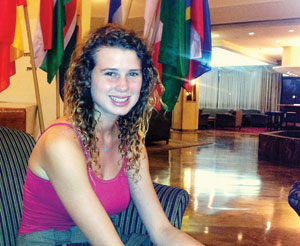 JERUSALEM — She’s tall, thin, has long curly blond hair and a bubbly personality. Rachel Kaplan, the 20-year-old daughter of BIAV members Gary Kaplan and Eileen Kaplan had just walked to the King Solomon Hotel from the Old City after spending most of a week hiking around Israel in a brand-new pre-army training program.
JERUSALEM — She’s tall, thin, has long curly blond hair and a bubbly personality. Rachel Kaplan, the 20-year-old daughter of BIAV members Gary Kaplan and Eileen Kaplan had just walked to the King Solomon Hotel from the Old City after spending most of a week hiking around Israel in a brand-new pre-army training program.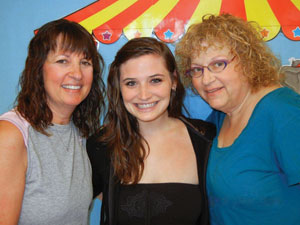 PRESCHOOL HIRES ‘GRADUATE’ — For the first time since Judy Jacks Berman has been director of Beth Shalom’s Rose Family Early Childhood Education Center, a job she has held for 19 years, Berman has had an opportunity to hire a graduate of the school! Jessica Rose was a student in the Pre-K class during Berman’s first year as the preschool director in 1994. Last week Rose, a graduate of the University of Denver, began her duties as an assistant teacher in the preschool. In addition to working at Beth Shalom, Rose is a student in the School Counseling Master’s Program at the University of Missouri-Kansas City. She is the daughter of Dr. Barry Rose and Judy Rose and the granddaughter of Eddie and Ellen Rose and the late Ruthie Rose. The preschool bears her family’s name.
PRESCHOOL HIRES ‘GRADUATE’ — For the first time since Judy Jacks Berman has been director of Beth Shalom’s Rose Family Early Childhood Education Center, a job she has held for 19 years, Berman has had an opportunity to hire a graduate of the school! Jessica Rose was a student in the Pre-K class during Berman’s first year as the preschool director in 1994. Last week Rose, a graduate of the University of Denver, began her duties as an assistant teacher in the preschool. In addition to working at Beth Shalom, Rose is a student in the School Counseling Master’s Program at the University of Missouri-Kansas City. She is the daughter of Dr. Barry Rose and Judy Rose and the granddaughter of Eddie and Ellen Rose and the late Ruthie Rose. The preschool bears her family’s name.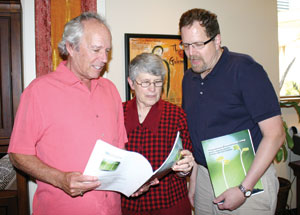 The Kansas City Melton School of Adult Jewish Learning, which is preparing to celebrate its 18th year in Kansas City, will now be run under the auspices of the Hyman Brand Hebrew Academy and will be known as Melton@HBHA. HBHA completed negotiations with the Florence Melton Adult Mini-School to house the local franchise this summer and is ready to begin programming after Simchat Torah. The local Melton program will be directed by Henri Goettel.
The Kansas City Melton School of Adult Jewish Learning, which is preparing to celebrate its 18th year in Kansas City, will now be run under the auspices of the Hyman Brand Hebrew Academy and will be known as Melton@HBHA. HBHA completed negotiations with the Florence Melton Adult Mini-School to house the local franchise this summer and is ready to begin programming after Simchat Torah. The local Melton program will be directed by Henri Goettel.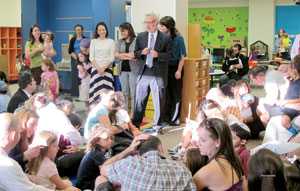 Up until now, HBHA has concentrated almost exclusively on educating children in grades K through 12. HBHA Head of School Howard Haas said the HBHA board now hopes the school can become the Jewish educational institute for the area.
Up until now, HBHA has concentrated almost exclusively on educating children in grades K through 12. HBHA Head of School Howard Haas said the HBHA board now hopes the school can become the Jewish educational institute for the area.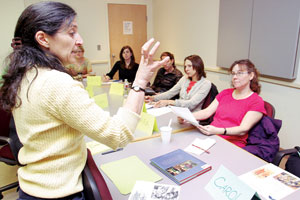 Last year the Jewish Community Center changed the name of its adult education department to Jewish Life & Learning and began changing the focus of its programming for that audience. One of the most recent changes was to part ways with the Florence Melton Adult Mini-School after 18 years.
Last year the Jewish Community Center changed the name of its adult education department to Jewish Life & Learning and began changing the focus of its programming for that audience. One of the most recent changes was to part ways with the Florence Melton Adult Mini-School after 18 years.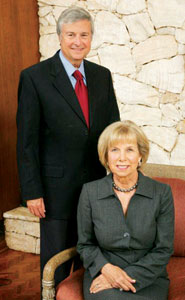 Howard Jacobson has been helping people in the Jewish community since he was a child; his parents were role models for this giving behavior and it stuck with him.
Howard Jacobson has been helping people in the Jewish community since he was a child; his parents were role models for this giving behavior and it stuck with him.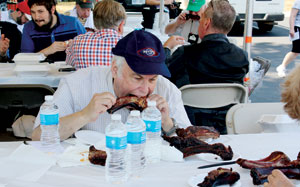 VIGIL SET — A Community Vigil for the Munich 11, marking the 40th anniversary of the murder of 11 Israeli athletes at the Munich Olympics, will be held at 6 p.m. Tuesday, Sept. 4, at Kehilath Israel Synagogue. It will be led by Rabbi Shmuly Yanklowitz, K.I.’s new senior rabbi. The 11 members of the Israeli Olympic Team were massacred at the Olympic Games in Munich on Sept. 8, 1972, by the Arab “Black September” terrorist organization. IOC President Jacques Rogge denied repeated requests for an official moment of silence during the 2012 Summer Games in London to honor the Munich 11.
VIGIL SET — A Community Vigil for the Munich 11, marking the 40th anniversary of the murder of 11 Israeli athletes at the Munich Olympics, will be held at 6 p.m. Tuesday, Sept. 4, at Kehilath Israel Synagogue. It will be led by Rabbi Shmuly Yanklowitz, K.I.’s new senior rabbi. The 11 members of the Israeli Olympic Team were massacred at the Olympic Games in Munich on Sept. 8, 1972, by the Arab “Black September” terrorist organization. IOC President Jacques Rogge denied repeated requests for an official moment of silence during the 2012 Summer Games in London to honor the Munich 11.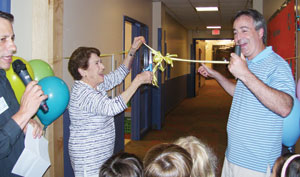
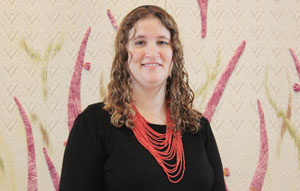 By the time Rabbi Rebecca Reice had completed her first month on the job as Congregation Beth Torah’s rabbi educator, she had already experienced a full smorgasbord of a rabbi’s life.
By the time Rabbi Rebecca Reice had completed her first month on the job as Congregation Beth Torah’s rabbi educator, she had already experienced a full smorgasbord of a rabbi’s life.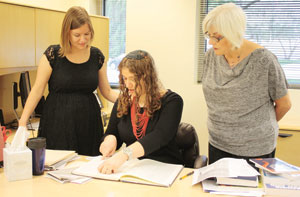 When Rabbi Reice first learned about the job opening at Beth Torah, she was intimidated by the job description.
When Rabbi Reice first learned about the job opening at Beth Torah, she was intimidated by the job description.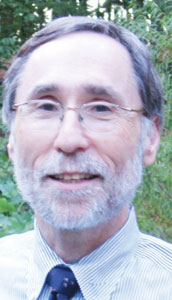 Rabbi John Friedman — a Kansas City native who grew up an active member of The Temple, Congregation B’nai Jehudah — met Congregation Beth Torah’s Rabbi Mark Levin in rabbinical school. They’ve been best friends ever since.
Rabbi John Friedman — a Kansas City native who grew up an active member of The Temple, Congregation B’nai Jehudah — met Congregation Beth Torah’s Rabbi Mark Levin in rabbinical school. They’ve been best friends ever since.